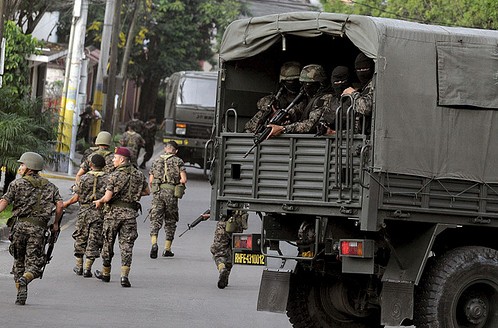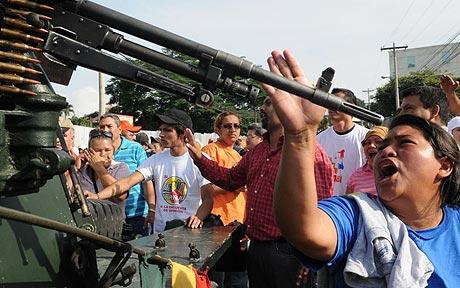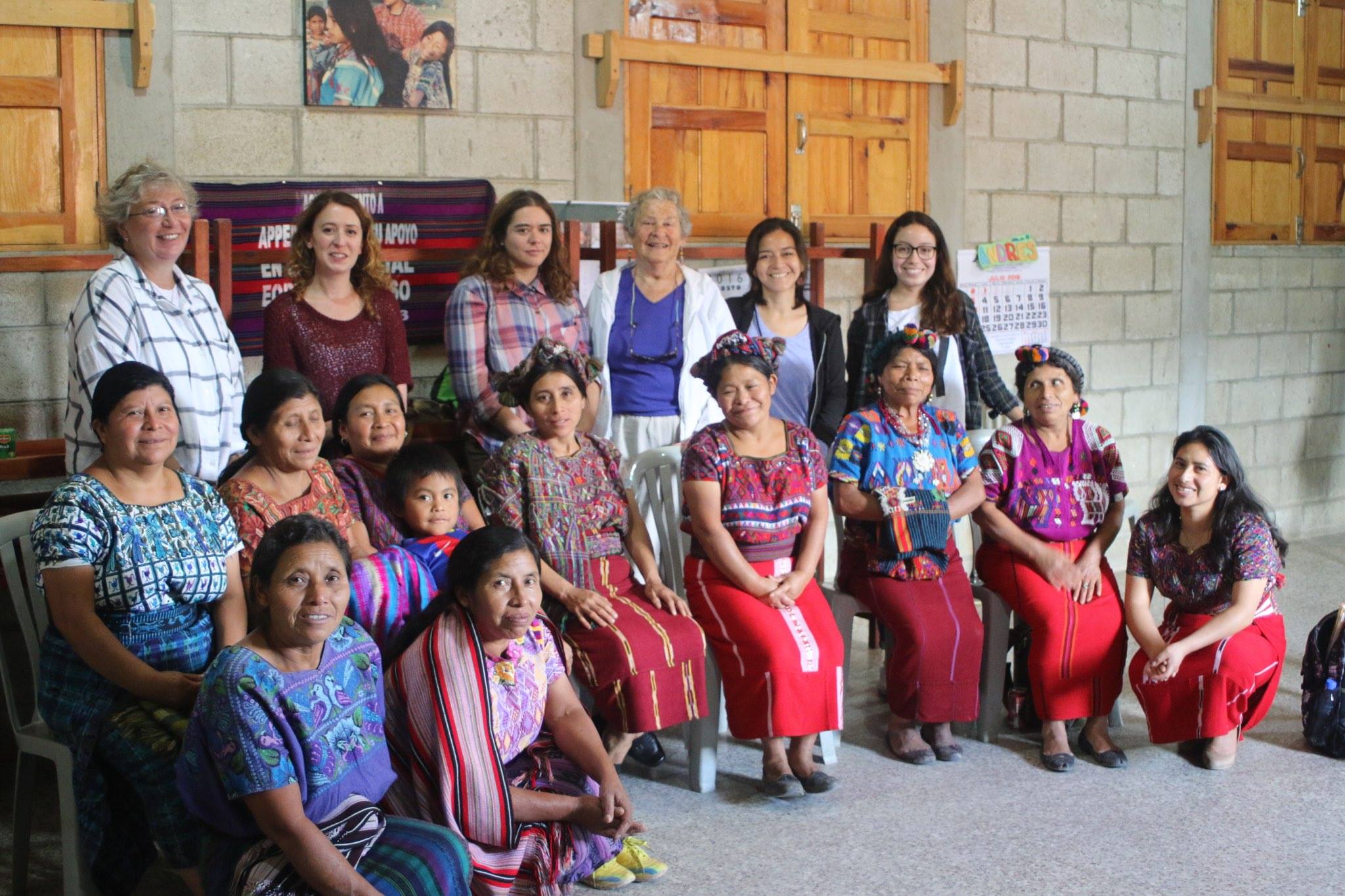Mujeres en Resistencia: Reporte de la Delegación de la Comisión de Derechos en Guatemala
Fotos:Trischa Goodnow
La Comisión de Derechos Humanos de Guatemala llevo a cabo su delegación anual en Agosto centrada en el rol crucial de las mujeres Guatemaltecas en la defensa de los derechos humanos. La delegación titulada “Defensoras: Mujeres Guatemaltecas Defendiendo Tierra, Justicia, y Derechos Humanos”, tomo lugar en diferentes localidades de Guatemala en las fechas de 30 de Julio al 7 de Agosto del 2016. Marisa León Gómez, miembro del personal de CRLN, se unió a otras mujeres que trabajan y promocionan los derechos humanos en los Estados Unidos y Latino América para aprender y compartir con sus colegas en Guatemala. La delegación comenzó en la ciudad de Guatemala con visitas a diferentes organizaciones, luego viajo a Nebaj, en el departamento de Quiche para encontrarse con mujeres de la Comunidad Maya Ixil, regreso a la Cuidad de Guatemala, y termino con una visita a las comunidades de San Jose del Golfo y San Pedro Ayampuc, las cuales están en una resistencia pacífica en contra de una minería Estadunidense. La primera visita de la delegación fue a una exhibición permanente ¿Por qué estamos como estamos?, para que las delegadas obtuvieran información de fondo de la situación de racismo, discriminación, desigualdad y violencia que actualmente aflige a la sociedad Guatemalteca.

Actualización de la Puya
La Resistencia de la Puya
es una resistencia pacífica por las comunidades de San Jose del Golfo y San Pedro Ayampuc en contra de la minería Estaunidense de oro Kappes, Cassidy & Associates. CRLN ha apoyado la Resistencia de la Puya, la cual se ha estado organizando en contra de la mina y en la defensa de su agua desde hace cuatro años y medio. En el 2012, Miriam Pixtun Monroy, lideresa Maya Indígena de la resistencia, asistió y hablo brevemente acerca de la resistencia en el Encuentro Anual de CRLN, después de que el orador principal termino. Martha Pierce, miembro de la Junta Directiva de CRLN, visita la resistencia cada año conjunto a su delegación que hace en Guatemala. La delegación de GHRC se encontró con Miriam en la Cuidad de Guatemala y luego viajaron a La Puya para ver personalmente la resistencia. Miembros de la resistencia, explicaron los nuevos avances a la delegación y las luchas que encuentran mientras continúan resistiendo pacíficamente la presencia de la mina en sus comunidades:
- La compañía minera nunca obtuvo un permiso legal de construcción para operar y también fallo en consultar a las comunidades antes de empezar la minería, violando los Acuerdos de Paz de Guatemala de 1996.
- Miembros de las comunidades han sido criminalizados, ha habido opresión militar y policial, y una gran división de familias ( en ciertas familias, ciertos miembros trabajan para la mina y otros miembros se oponen a la mina y son parte de la resistencia)
- La comunidad gano amparos en contra de la compañía minera, lo cual tuvo que haber parado cualquier actividad minera desde Noviembre del 2015. Sin embargo, las comunidades no fueron notificadas de su victoria hasta Enero del 2016.
- Debido a que la compañía minera no paro sus actividades aun con una orden de la Corte Constitucional, la comunidad comenzó una segunda resistencia en frente del Ministerio de Energía y Minas en la Cuidad de Guatemala la cual llamaron
“ La Puyita”
. Esto se debe a que el Ministerio de Energía y Minas dijo que iba a “analizar” la orden de la Corte Constitucional, en vez de simplemente acatar la orden como se supone que lo tienen que hacer.
- Debido a la resistencia en ambos lados, La Puya y la Puyita, la compañía minera finalmente paro todas sus actividades el 10 de Mayo del 2016. Legalmente, no debería de haber ninguna actividad dentro de la mina. Sin embargo en la visita de la delegación a la Puya, los delegados presenciaron un carro conduciéndose en el complejo de mina y miembros de la resistencia reportaron actividades mineras llevadas a cabo por helicópteros y otras formas.
- Miembros de la resistencia, también reportaron que hay rumores que el Ministerio de Energía y Minas quiere utilizar otro amparo justificándose en que Kappes, Cassidy & Associates han invertido más de $40 millones, y que deben completar su trabajo para que todo su capital no se desperdicie y para que inversores extranjeros no tengan miedo de invertir en Guatemala.
- Las comunidades ya están vigilantes del hecho que la compañía minera puede demandar al Gobierno de Guatemala,
como fue el caso en El Salvador.
La resistencia realmente aprecia la presión en contra del Gobierno de Guatemala y de la compañía minera y el trabajo de solidaridad con su causa. Miembros de la resistencia dicen que el apoyo internacional es muy importante para su trabajo y para la defensa de los ríos y el medio ambiente.
La CICIG, Corrupción y El Ministerio Publico de Guatemala
La organizaciones de derechos humanos y de justicia social aprecian el trabajo de la
Comisión Internacional en Contra de la Impunidad en Guatemala (CICIG).
Muchas defensores y defensoras de derechos humanos durante la delegación expresaron que el record de derechos humanos de Guatemala sería peor de no ser por la CICIG. Sin embargo, muchas organizaciones dijeron que la CICIG está fallando en trabajar con mujeres y movimientos u organizaciones indígenas.
La Red de No Violencia en Contra de la Mujer (REDNOVI)
expreso que la CICIG no ha beneficiado la prevención de la violencia en contra de la mujeres. La representante de REDNOVI espera que la CICIG comience una investigación de estructuras paralelas que previenen el proceso de la prevención de la violencia en contra de la mujer pueda avanzar. Igualmente, miembros de la resistencia de la Puya esperan que la CICIG pueda ayudar con su caso. Como se explicó arriba, la compañía minera Estadunidense Kappes, Cassidy & Associates ha operado ilegalmente en Guatemala, y miembros de la resistencia han sido injustamente criminalizados.
Adicionalmente, El Ministerio Publico de Guatemala ha tenido un rol prominente en los casos de corrupción de oficiales de alto rango. La actual Fiscal, Thelma Aldana, llevo a cabo investigaciones que probaron que el ex- Presidente Otto Pérez Molina y la ex- Vicepresidente Roxana Baldetti estuvieron involucrados en el escándalo de corrupción de la aduana en Guatemala. La Fiscal previa, Claudia Paz y Paz, hizo un gran cambio en el sistema judicial de Guatemala, siendo su mayor logro la sentencia en cargos de genocidio y crimines de lesa humanidad del Militar General y ex-Presidente Efraín Ríos Montt. La sentencia de Ríos Montt fue anulada por la Corte Constitucional días después, Sin embargo la juez Paz y Paz desafío el statu quo en Guatemala y abrió las puertas de la justicia, las cuales habían estado cerradas por mucho tiempo.
La corupcion rampante en Guatemala continua, tanto en el gobierno como en la oligarquía Guatemalteca. Impuestos bajos y/o evasión de impuestos por los ricos de Guatemala continúan teniendo un gran efecto en el país. Iduvina Hernandez, de
SEDEM
, explico a la delegación que el 6% más rico de la población evita pagar impuestos, y los que sí pagan (las clases trabajadoras) son robados por el gobierno. Los niveles de impunidad en Guatemala son alrededor del 90% por corrupción y evasión de impuestos. Igualmente, los gobernantes de Guatemala defienden de cualquier manera posible los intereses económicos de la elite y de empresas extranjeras. Todo esto roba al estado de fondos, haciéndolo difícil que la situación vulnerable del país mejore.
La Administración de Jimmy Morales y los Militares
A pesar de haber progreso en Guatemala en las áreas de impunidad y corrupción, con el arresto del ex Presidente y Vicepresidente, el gobierno de Jimmy Morales está lejos de ser el ideal. El Presidente Morales ha sido vinculado con y ha defendido a los militares que estuvieron involucrados en el conflicto armado interno y en violaciones de derechos humanos. Morales ha reclamado el país vecino de Belice como Guatemalteco, ha incluido mensajes xenofóbicos y racistas como parte de su comedia, y ha negado que el genocidio en contra de la Comunidad Maya Ixil haya ocurrido.
Plan Alianza de la Prosperidad
CRLN,
conjunto a otras organizaciones, están dudosos del Plan propuesto como Alianza para la Prosperidad, dando $750 millones de dólares a los países del Triángulo Norte: Honduras, Guatemala, y El Salvador. Las organizaciones de derechos humanos están escépticos de las siguientes tres razones: a) El plan apoya la inversión extranjera en los tres países, lo cual puede resultar en situaciones como la de la Puya, b)Una gran parte del dinero va hacia los militares y las iniciativas de seguridad, a pesar de que hay pruebas de violaciones a derechos humanos por los militares y y la correlación de los altos niveles de violencia con la presencia de los militares en las calles, c) El dinero va a gobiernos corruptos los cuales tienen records terribles en valorar los derechos humanos. Adicionalmente, el plan se ve como un esfuerzo para parar inmigración a los EE.UU. a través de la militarización y la detención de inmigrantes antes de que lleguen a tierras Estadunidenses. Los delegados de GHRC se reunieron con representantes de la Embajada de Estados Unidos en Guatemala y encontraron que los EE.UU. todavía tiene confianza en los militares de Guatemala, al expresar que, “ los militares del presente son diferentes”. La delegación tuvo una discusión con el representante de la Embajada Estadunidense acerca de puntos de consternación en el ámbito de derechos humanos en Guatemala.
Mujeres en Resistencia (Lista y Resumen de Organizaciones durante la delegación)
La primera reunión organizacional fue con
FAMDEGUA
(Familias de Desaparecidos de Guatemala) la cual fue fundada por familiares, sobre todo madres y esposas, de los desaparecidos del conflicto armado interno. 45,000 personas fueran desaparecidas forzosamente durante el conflicto armado en Guatemala. FAMDEGUA tiene un papel crucial en el rol de exhumaciones de cementerios clandestinos y reparaciones a las víctimas, así como acompañar casos como el de la mascare de las Dos Erres. A pesar de recibir amenazas a muerte y vandalismo en sus oficinas, de 107 exhumaciones hechas, 1276 restos han sido recuperados.
La siguiente fue una reunión con
SEDEM
(Seguridad en Democracia). Guatemala siendo un país extremadamente peligroso para defensores y defensoras de derechos humanos, SEDEM trabaja en en la evaluación de riesgos y medidas de autoprotección para los defensores. SEDEM trabaja tambien con la reforma del ejército y la policía desde una perspectiva de derechos humanos y en la desclasificación de información de violaciones de derechos humanos durante el conflicto armado interno.
La siguiente reunión tomo lugar en Nebaj, en el departamento de El Quiche, donde hubo un genocidio de la comunidad Maya Ixil.
Equipo de Estudios Comunitarios y Acción Psicosocial (ECAP)
es una organization que trabaja en factores psicosociales con individuos y comunidades que han sufrido 30 años del conflicto armado interno. Esto incluye trabajar y brindar apoyo psicosocial a las mujeres y las comunidades indígenas que ahora son testigos de los juicios por genocidio y / o violencia sexual durante el conflicto armado.
Luego la delegación se reunió con
la Asociación Flor de Maguey y el Centro para la Acción Legal en Derechos Humanos, CALDH.
La reunión con la Asociación Flor de Maguey fue probablemente la más emotiva para la delegación, ya que la Asociación consiste en un grupo de mujeres sobrevivientes mayas del genocidio en la región de Quiché. La delegación escuchó el testimonio de cada mujer en el idioma maya Ixil, luego traducido al español y más tarde al Inglés. Las mujeres hablaron de diferentes traumas vividos durante y después del conflicto armado interno, incluyendo el sufrimiento de violencia sexual, la desaparición forzada de miembros de la familia, presenciar la matanza de miembros de la familia, y testificar en el caso de genocidio de Ríos Montt. Las mujeres formaron una red de apoyo en sus comunidades y se ayudaron mutuamente a sanar al compartir sus historias, el dolor y la búsqueda de la justicia.
CALDH
es un grupo que apoya a grupos como la Asociación de la flor Maguey, proporcionando acompañamiento pysco-social y ayudando a luchar por la verdad y la justicia.
Finalmente en Nebaj, Las delegadas se reunieron con
la Red de Mujeres Ixiles
la cual consiste en una red de 364 mujeres que trabaja para apoyar a las víctimas de la violencia actual contra las mujeres y para avanzar en los derechos de las mujeres.
De regreso en la Cuidad de Guatemala, la última visita organizacional fue con
La Red de No Violencia en Contra de la Mujer (REDNOVI),
la cual trabaja para prevenir, actuar y eliminar todas las formas de violencia y opresión en contra de las mujeres. REDNOVI trabaja en leyes, políticas públicas y mecanismos específicos por la defensa y el avance de las mujeres. La red está formada por diferentes organizaciones que trabajan en diferentes áreas en la defensa de los derechos de la mujer.

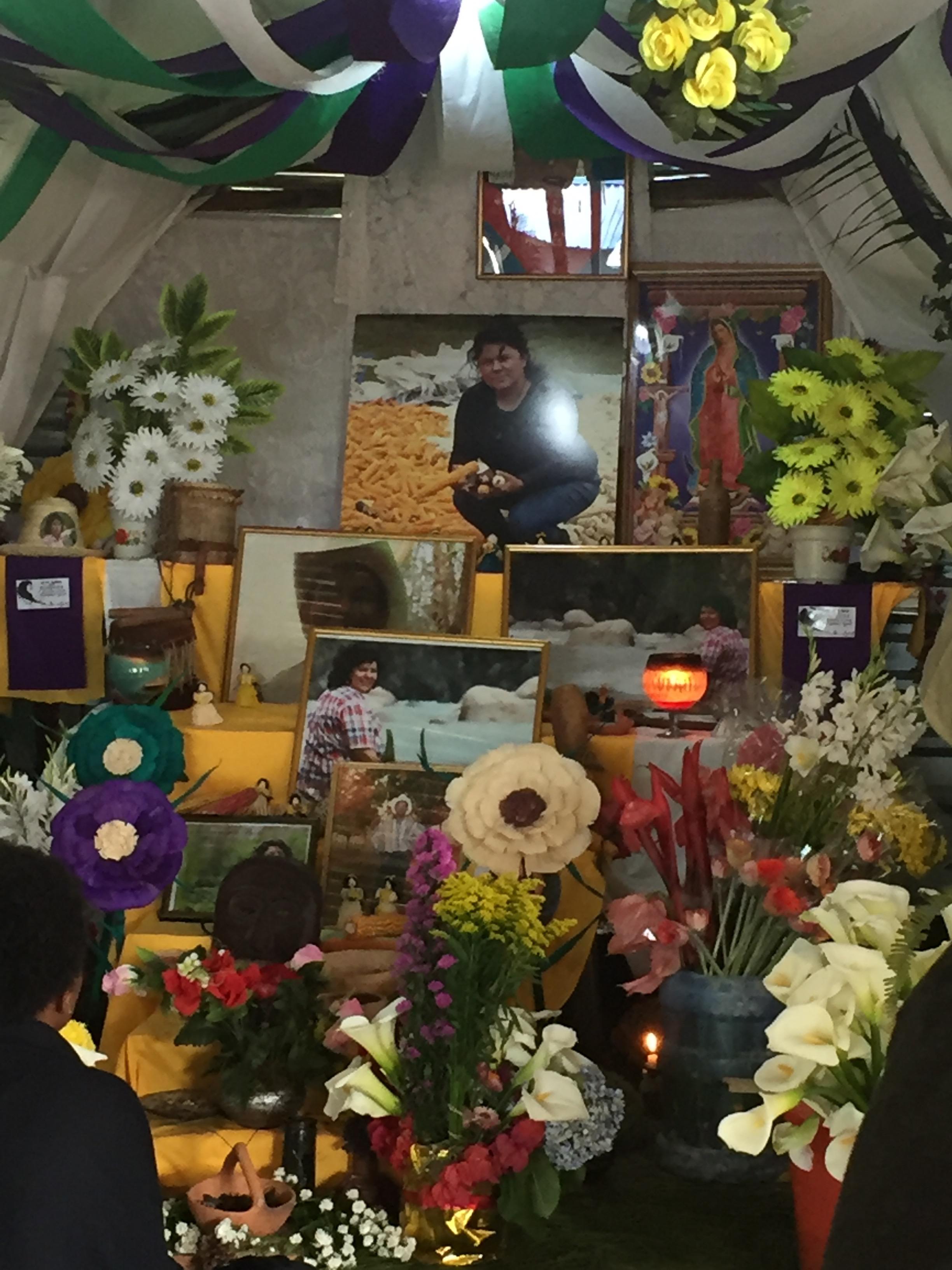
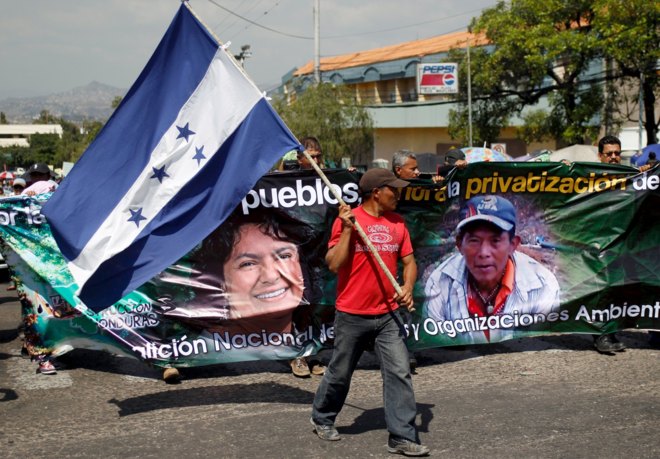
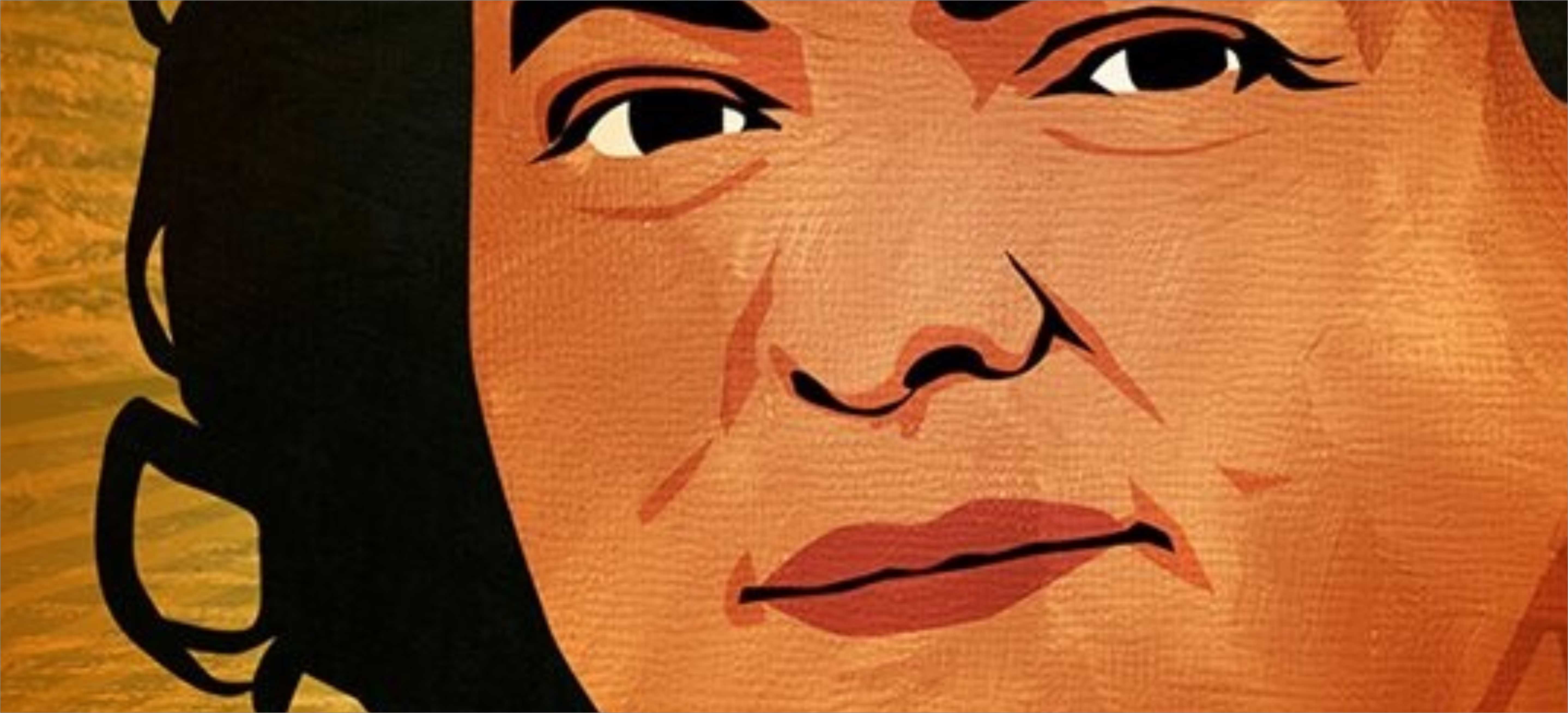

 That the rights of “…land rights defenders; trade unionists; journalists; Indigenous, Afro-Indigenous, small farmer and LGBTI activists; human rights defenders; critics of the government; and other civil society activists…” are protected.
That the rights of “…land rights defenders; trade unionists; journalists; Indigenous, Afro-Indigenous, small farmer and LGBTI activists; human rights defenders; critics of the government; and other civil society activists…” are protected.

